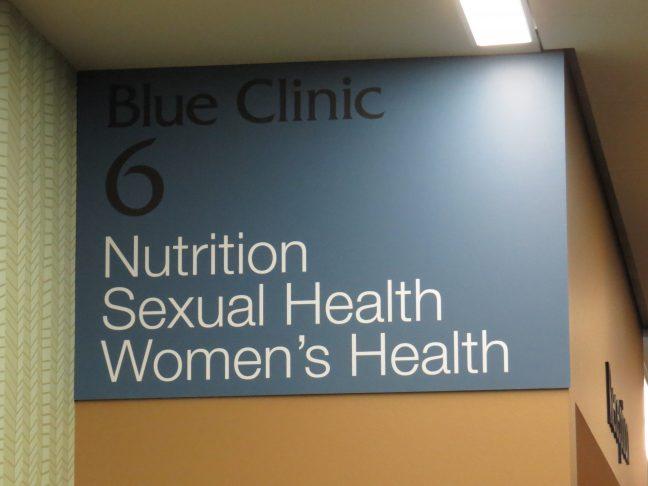The Student Services Finance Committee discussed a recommendation Monday for University Health Services to offer emergency contraceptive pills, such as Plan B, at a reduced cost to University of Wisconsin students.
Rep. Jordan Madden and Rep. Sophia Alzaidi spearheaded the recommendation. If it were to be adopted by SSFC, it would advise UW Chancellor Rebecca Blank to change how UHS currently administers emergency contraception.
Under current procedures, UHS spends the $4,000 it allocates toward emergency contraception on intrauterine devices and offers it only to survivors of sexual assault. Under Madden and Alzaidi’s recommendation, the final destination of these funds would instead be directed toward emergency contraceptive pills like Plan B.
“The current funds that are supposed to be allocated for emergency contraception in the form of long-term IUDs should instead be used for offering the progestin-only Plan B One Step oral contraceptive at a free or subsidized cost to the UW-Madison student body to allow for easy access and affordability in getting these resources in cases of emergencies,” Alzaidi said.
UHS aims to expand mental health services through new online program, added staff
Madden and Alzaidi believe by providing Plan B, which is considerably less expensive than copper IUDs, UHS could expand their services to include more of the student population and not just survivors of sexual assault. Additionally, the recommendation suggests offering Plan B at a subsidized or possibly free cost to students.
Madden said UHS’s current operations, which offer long-acting and reversible birth control as emergency contraception, has “several shortcomings.” According to a 2012 study Madden cited, 85 percent of clinicians said they never recommended the copper IUD for emergency contraception because of its expense and because of the burden of multiple medical visits which oftentimes accompanies IUD insertions.
According to data outlined in Madden and Alzaidi’s recommendation, offering emergency contraception in the form of IUDs strictly to survivors of sexual assault benefits only five students on the UW campus. Madden suggested by offering cheaper oral contraceptives at a reduced cost, like Plan B, more students would benefit.
“For our purposes, with this specific resource being specifically offered to survivors of sexual assault — that only ultimately benefits five students — it could potentially benefit many, many more if we used an progestin-only oral contraceptive,” Madden said.
According to Madden and Alzaidi’s recommendation, if UHS spent anywhere from $20 to $50 in purchasing Plan B, it could serve anywhere from 80 to 200 students if UHS offered it for free. If UHS sold the same Plan B for the subsidized rate of anywhere from $5 to $10 per unit, UHS could serve anywhere from 100 to 800 students.
Madden and Alzaidi also identified two obstacles to their recommendation’s implementation. According to the recommendation, the federal Food and Drug Administration prohibits the sale of emergency contraceptives to individuals under the age of 17. Madden said this obstacle should not be a problem, as most college students are 18 years or older.
The second obstacle focused on the restricted hours students have access to UHS. Madden said this obstacle could be dealt with by distributing the UHS-funded Plan B at more universally-accessible locations, such as university residence halls.
UW spokeswoman Meredith McGlone, however, said issues remain with the recommendation and said the UHS budget for emergency contraception responds to needs of victims of sexual assault.
“As we’ve previously said, there are a number of legal and logistical issues with the proposal — those remain,” McGlone said. “UHS provides holistic clinical reproductive services and our budget request responds to a specific clinical need for victims of sexual assault.”
UHS ‘happy’ to discuss offering subsidized emergency contraception
In discussing the recommendation, other SSFC representatives expressed their concerns. Rep. Dylan Resch and Rep. Henry Galles both said IUDs are the most effective form of birth control and would like to see it remain as an option open to students.
Rep. Zaakir Abdul-Wahid echoed those sentiments and expressed support for a plan which would make emergency contraception free for survivors of sexual assault, while Vice Chair Kristi Parsons said she wanted emergency contraception offered through UHS to remain accessible only to survivors of sexual assault.
Parsons did, however, support offering both IUDs and Plan B as emergency contraception and said she expects the plan to continue to grow and develop further in coming years.
The committee decided to postpone both the vote on the recommendation and the final vote on UHS’s budget until Monday, Feb. 19.
SSFC also held the budget hearing for UW Recreational Sports at Monday’s meeting.
John Horn, the director of the Division of Recreational Sports, requested a $1.32 increase in segregated fees allocated toward Recreational Sports in 2019 — a move which would bring the organization’s segregated fee total to $63.90 per student. This amount would leave UW students with the second-lowest segregated fee for recreational sports among Big Ten schools, and roughly $80 less than the Big Ten average of $141.20 per student.
Horn also revealed plans to rename the Division of Recreational Sports to “University Recreation and Wellness” upon completion of the Nick’s construction, a name which he believes is better suited to the organization’s goals and mission statement.
SSFC will vote on the final budget for UW Recreational Sports at a later date and will tour current recreational sports facilities at Ogg Residence Hall Thursday.


















